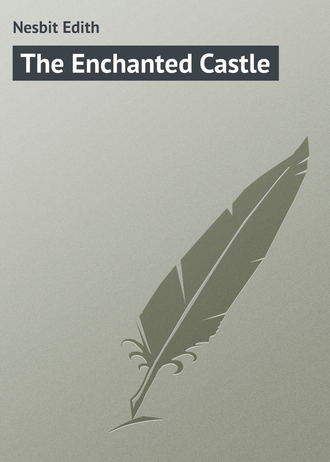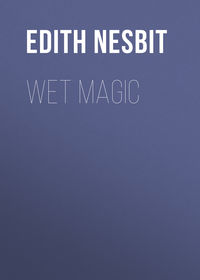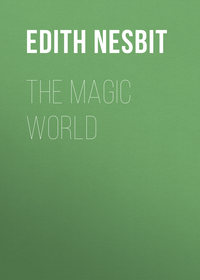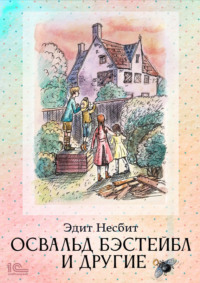 полная версия
полная версияThe Enchanted Castle
Everything was pleasant that day somehow. There are some days like that, you know, when everything goes well from the very beginning; all the things you want are in their places, nobody misunderstands you, and all that you do turns out admirably. How different from those other days which we all know too well, when your shoe-lace breaks, your comb is mislaid, your brush spins on its back on the floor and lands under the bed where you can't get at it – you drop the soap, your buttons come off, an eyelash gets into your eye, you have used your last clean handkerchief, your collar is frayed at the edge and cuts your neck, and at the very last moment your suspender breaks, and there is no string. On such a day as this you are naturally late for breakfast, and every one thinks you did it on purpose. And the day goes on and on, getting worse and worse – you mislay your exercise-book, you drop your arithmetic in the mud, your pencil breaks, and when you open your knife to sharpen the pencil you split your nail. On such a day you jam your thumb in doors, and muddle the messages you are sent on by grown-ups. You upset your tea, and your bread-and-butter won't hold together for a moment. And when at last you get to bed – usually in disgrace – it is no comfort at all to you to know that not a single bit of it is your own fault.
This day was not one of those days, as you will have noticed. Even the tea in the garden – there was a bricked bit by a rockery that made a steady floor for the tea-table – was most delightful, though the thoughts of four out of the five were busy with the coming play, and the fifth had thoughts of her own that had had nothing to do with tea or acting.
Then there was an interval of slamming doors, interesting silences, feet that flew up and down stairs.
It was still good daylight when the dinner-bell rang – the signal had been agreed upon at tea-time, and carefully explained to Eliza. Mademoiselle laid down her book and passed out of the sunset-yellowed hall into the faint yellow gaslight of the dining-room. The giggling Eliza held the door open before her, and followed her in. The shutters had been closed – streaks of daylight showed above and below them. The green-and-black tablecloths of the school dining-tables were supported on the clothes-line from the backyard. The line sagged in a graceful curve, but it answered its purpose of supporting the curtains which concealed that part of the room which was the stage.
Rows of chairs had been placed across the other end of the room – all the chairs in the house, as it seemed – and Mademoiselle started violently when she saw that fully half a dozen of these chairs were occupied. And by the queerest people, too – an old woman with a poke bonnet tied under her chin with a red handkerchief, a lady in a large straw hat wreathed in flowers and the oddest hands that stuck out over the chair in front of her, several men with strange, clumsy figures, and all with hats on.
"But," whispered Mademoiselle, through the chinks of the tablecloths, "you have then invited other friends? You should have asked me, my children."
Laughter and something like a "hurrah" answered her from behind the folds of the curtaining tablecloths.
"All right, Mademoiselle Rapunzel," cried Mabel; "turn the gas up. It's only part of the entertainment."
Eliza, still giggling, pushed through the lines of chairs, knocking off the hat of one of the visitors as she did so, and turned up the three incandescent burners.
Mademoiselle looked at the figure seated nearest to her, stooped to look more closely, half laughed, quite screamed, and sat down suddenly.
"Oh!" she cried, "they are not alive!"
Eliza, with a much louder scream, had found out the same thing and announced it differently. "They ain't got no insides," said she. The seven members of the audience seated among the wilderness of chairs had, indeed, no insides to speak of. Their bodies were bolsters and rolled-up blankets, their spines were broom-handles, and their arm and leg bones were hockey sticks and umbrellas. Their shoulders were the wooden cross-pieces that Mademoiselle used for keeping her jackets in shape; their hands were gloves stuffed out with handkerchiefs; and their faces were the paper masks painted in the afternoon by the untutored brush of Gerald, tied on to the round heads made of the ends of stuffed bolster-cases. The faces were really rather dreadful. Gerald had done his best, but even after his best had been done you would hardly have known they were faces, some of them, if they hadn't been in the positions which faces visually occupy, between the collar and the hat. Their eyebrows were furious with lamp-black frowns – their eyes the size, and almost the shape, of five-shilling pieces, and on their lips and cheeks had been spent much crimson lake and nearly the whole of a half-pan of vermilion.
"You have made yourself an auditors, yes? Bravo!" cried Mademoiselle, recovering herself and beginning to clap. And to the sound of that clapping the curtain went up – or, rather, apart. A voice said, in a breathless, choked way, "Beauty and the Beast," and the stage was revealed.
It was a real stage too – the dining-tables pushed close together and covered with pink-and-white counterpanes. It was a little unsteady and creaky to walk on, but very imposing to look at. The scene was simple, but convincing. A big sheet of cardboard, bent square, with slits cut in it and a candle behind, represented, quite transparently, the domestic hearth; a round hat-tin of Eliza's, supported on a stool with a night-light under it, could not have been mistaken, save by wilful malice, for anything but a copper. A waste-paper basket with two or three school dusters and an overcoat in it, and a pair of blue pyjamas over the back of a chair, put the finishing touch to the scene. It did not need the announcement from the wings, "The laundry at Beauty's home." It was so plainly a laundry and nothing else.
In the wings: "They look just like a real audience, don't they?" whispered Mabel. "Go on, Jimmy, – don't forget the Merchant has to be pompous and use long words."
Jimmy, enlarged by pillows under Gerald's best overcoat, which had been intentionally bought with a view to his probable growth during the two years which it was intended to last him, a Turkish towel turban on his head and an open umbrella over it, opened the first act in a simple and swift soliloquy:
"I am the most unlucky merchant that ever was. I was once the richest merchant in Bagdad, but I lost all my ships, and now I live in a poor house that is all to bits; you can see how the rain comes through the roof, and my daughters take in washing. And – "
The pause might have seemed long, but Gerald rustled in, elegant in Mademoiselle's pink dressing-gown and the character of the eldest daughter.
"A nice drying day," he minced. "Pa dear, put the umbrella the other way up. It'll save us going out in the rain to fetch water. Come on, sisters, dear father's got us a new wash-tub. Here's luxury!"
Round the umbrella, now held the wrong way up, the three sisters knelt and washed imaginary linen. Kathleen wore a violet skirt of Eliza's, a blue blouse of her own, and a cap of knotted handkerchiefs. A white nightdress girt with a white apron and two red carnations in Mabel's black hair left no doubt as to which of the three was Beauty.
The scene went very well. The final dance with waving towels was all that there is of charming, Mademoiselle said; and Eliza was so much amused that, as she said, she got quite a nasty stitch along of laughing so hearty.
You know pretty well what Beauty and the Beast would be like acted by four children who had spent the afternoon in arranging their costumes and so had left no time for rehearsing what they had to say. Yet it delighted them, and it charmed their audience. And what more can any play do, even Shakespeare's? Mabel, in her Princess clothes, was a resplendent Beauty; and Gerald a Beast who wore the drawing-room hearthrugs with an air of indescribable distinction. If Jimmy was not a talkative merchant, he made it up with a stoutness practically unlimited, and Kathleen surprised and delighted even herself by the quickness with which she changed from one to the other of the minor characters – fairies, servants, and messengers. It was at the end of the second act that Mabel, whose costume, having reached the height of elegance, could not be bettered and therefore did not need to be changed, said to Gerald, sweltering under the weighty magnificence of his beast-skin: —
"I say, you might let us have the ring back."
"I'm going to," said Gerald, who had quite forgotten it. "I'll give it you in the next scene. Only don't lose it, or go putting it on. You might go out all together and never be seen again, or you might get seven times as visible as any one else, so that all the rest of us would look like shadows beside you, you'd be so thick, or – "
"Ready!" said Kathleen, bustling in, once more a wicked sister.
Gerald managed to get his hand into his pocket under his hearthrug, and when he rolled his eyes in agonies of sentiment, and said, "Farewell, dear Beauty! Return quickly, for if you remain long absent from your faithful beast he will assuredly perish," he pressed a ring into her hand and added: "This is a magic ring that will give you anything you wish. When you desire to return to your own disinterested beast, put on the ring and utter your wish. Instantly you will be by my side."
Beauty-Mabel took the ring, and it was the ring.
The curtains closed to warm applause from two pairs of hands.
The next scene went splendidly. The sisters were almost too natural in their disagreeableness, and Beauty's annoyance when they splashed her Princess's dress with real soap and water was considered a miracle of good acting. Even the merchant rose to something more than mere pillows, and the curtain fell on his pathetic assurance that in the absence of his dear Beauty he was wasting away to a shadow. And again two pairs of hands applauded.
"Here, Mabel, catch hold," Gerald appealed from under the weight of a towel-horse, the tea-urn, the tea-tray, and the green baize apron of the boot boy, which together with four red geraniums from the landing, the pampas-grass from the drawing-room fireplace, and the indiarubber plants from the drawing-room window were to represent the fountains and garden of the last act. The applause had died away.
"I wish," said Mabel, taking on herself the weight of the tea-urn, "I wish those creatures we made were alive. We should get something like applause then."
"I'm jolly glad they aren't," said Gerald, arranging the baize and the towel-horse. "Brutes! It makes me feel quite silly when I catch their paper eyes."
The curtains were drawn back. There lay the hearth-rug-coated beast, in flat abandonment among the tropic beauties of the garden, the pampas-grass shrubbery, the indiarubber plant bushes, the geranium-trees and the urn fountain. Beauty was ready to make her great entry in all the thrilling splendour of despair. And then suddenly it all happened.
Mademoiselle began it: she applauded the garden scene – with hurried little clappings of her quick French hands. Eliza's fat red palms followed heavily, and then – some one else was clapping, six or seven people, and their clapping made a dull padded sound. Nine faces instead of two were turned towards the stage, and seven out of the nine were painted, pointed paper faces. And every hand and every face was alive. The applause grew louder as Mabel glided forward, and as she paused and looked at the audience her unstudied pose of horror and amazement drew forth applause louder still; but it was not loud enough to drown the shrieks of Mademoiselle and Eliza as they rushed from the room, knocking chairs over and crushing each other in the doorway. Two distant doors banged, Mademoiselle's door and Eliza's door.
"Curtain! curtain! quick!" cried Beauty-Mabel, in a voice that wasn't Mabel's or the Beauty's. "Jerry – those things have come alive. Oh, whatever shall we do?"
Gerald in his hearthrugs leaped to his feet. Again that flat padded applause marked the swish of cloths on clothes-line as Jimmy and Kathleen drew the curtains.
"What's up?" they asked as they drew.
"You've done it this time!" said Gerald to the pink, perspiring Mabel. "Oh, bother these strings!"
"Can't you burst them? I've done it?" retorted Mabel. "I like that!"
"More than I do," said Gerald.
"Oh, it's all right," said Mabel, "Come on. We must go and pull the things to pieces – then they can't go on being alive."
"It's your fault, anyhow," said Gerald with every possible absence of gallantry. "Don't you see? It's turned into a wishing ring. I knew something different was going to happen. Get my knife out of my pocket – this string's in a knot. Jimmy, Cathy, those Ugly-Wuglies have come alive – because Mabel wished it. Cut out and pull them to pieces."
Jimmy and Cathy peeped through the curtain and recoiled with white faces and staring eyes. "Not me!" was the brief rejoinder of Jimmy. Cathy said, "Not much!" And she meant it, any one could see that.
And now, as Gerald, almost free of the hearth-rugs, broke his thumb-nail on the stiffest blade of his knife, a thick rustling and a sharp, heavy stumping sounded beyond the curtain.
"They're going out!" screamed Kathleen – "walking out – on their umbrella and broomstick legs. You can't stop them, Jerry, they're too awful!"
"Everybody in the town'll be insane by to-morrow night if we don't stop them," cried Gerald. "Here, give me the ring – I'll unwish them."
He caught the ring from the unresisting Mabel, cried, "I wish the Uglies weren't alive," and tore through the door. He saw, in fancy, Mabel's wish undone, and the empty hall strewed with limp bolsters, hats, umbrellas, coats and gloves, prone abject properties from which the brief life had gone out for ever. But the hall was crowded with live things, strange things – all horribly short as broomsticks and umbrellas are short. A limp hand gesticulated. A pointed white face with red cheeks looked up at him, and wide red lips said something, he could not tell what. The voice reminded him of the old beggar down by the bridge who had no roof to his mouth. These creatures had no roofs to their mouths, of course – they had no —
"Aa oo ré o me me oo a oo ho el?" said the voice again. And it had said it four times before Gerald could collect himself sufficiently to understand that this horror – alive, and most likely quite uncontrollable – was saying, with a dreadful calm, polite persistence: —
"Can you recommend me to a good hotel?"
CHAPTER VII
"Can you recommend me to a good hotel?" The speaker had no inside to his head. Gerald had the best of reasons for knowing it. The speaker's coat had no shoulders inside it – only the cross-bar that a jacket is slung on by careful ladies. The hand raised in interrogation was not a hand at all; it was a glove lumpily stuffed with pocket-handkerchiefs; and the arm attached to it was only Kathleen's school umbrella. Yet the whole thing was alive, and was asking a definite, and for anybody else, anybody who really was a body, a reasonable question.
With a sensation of inward sinking, Gerald realised that now or never was the time for him to rise to the occasion. And at the thought he inwardly sank more deeply than before. It seemed impossible to rise in the very smallest degree.
"I beg your pardon" was absolutely the best he could do; and the painted, pointed paper face turned to him once more, and once more said: —
"Aa oo ré o me me oo a oo ho el?"
"You want a hotel?" Gerald repeated stupidly, "a good hotel?"
"A oo ho el," reiterated the painted lips.
"I'm awfully sorry," Gerald went on – one can always be polite, of course, whatever happens, and politeness came natural to him – "but all our hotels shut so early – about eight, I think."
"Och em er," said the Ugly-Wugly. Gerald even now does not understand how that practical joke – hastily wrought of hat, overcoat, paper face and limp hands – could have managed, by just being alive, to become perfectly respectable, apparently about fifty years old, and obviously well off, known and respected in his own suburb – the kind of man who travels first class and smokes expensive cigars. Gerald knew this time, without need of repetition, that the Ugly-Wugly had said: —
"Knock 'em up."
"You can't," Gerald explained; "they're all stone deaf – every single person who keeps a hotel in this town. It's – " he wildly plunged – "it's a County Council law. Only deaf people allowed to keep hotels. It's because of the hops in the beer," he found himself adding; "you know, hops are so good for earache."
"I o wy ollo oo," said the respectable Ugly-Wugly; and Gerald was not surprised to find that the thing did "not quite follow him."
"It is a little difficult at first," he said. The other Ugly-Wuglies were crowding round. The lady in the poke bonnet said – Gerald found he was getting quite clever at understanding the conversation of those who had no roofs to their mouths: —
"If not a hotel, a lodging."
"My lodging is on the cold ground," sang itself unhidden and unavailing in Gerald's ear. Yet stay – was it unavailing?
"I do know a lodging," he said slowly, "but – " The tallest of the Ugly-Wuglies pushed forward. He was dressed in the old brown overcoat and top-hat which always hung on the school hat-stand to discourage possible burglars by deluding them into the idea that there was a gentleman-of-the-house, and that he was at home. He had an air at once more sporting and less reserved than that of the first speaker, and any one could see that he was not quite a gentleman.
"Wa I wo oo oh," he began, but the lady Ugly-Wugly in the flower-wreathed hat interrupted him. She spoke more distinctly than the others, owing, as Gerald found afterwards, to the fact that her mouth had been drawn open, and the flap cut from the aperture had been folded back – so that she really had something like a roof to her mouth, though it was only a paper one.
"What I want to know," Gerald understood her to say, "is where are the carriages we ordered?"
"I don't know," said Gerald, "but I'll find out. But we ought to be moving," he added; "you see, the performance is over, and they want to shut up the house and put the lights out. Let's be moving."
"Eh – ech e oo-ig," repeated the respectable Ugly-Wugly, and stepped towards the front door.
"Oo um oo," said the flower-wreathed one; and Gerald assures me that her vermilion lips stretched in a smile.
"I shall be delighted," said Gerald with earnest courtesy, "to do anything, of course. Things do happen so awkwardly when you least expect it. I could go with you, and get you a lodging, if you'd only wait a few moments in the – in the yard. It's quite a superior sort of yard," he went on, as a wave of surprised disdain passed over their white paper faces – "not a common yard, you know; the pump," he added madly, "has just been painted green all over, and the dustbin is enamelled iron."
The Ugly-Wuglies turned to each other in consultation, and Gerald gathered that the greenness of the pump and the enamelled character of the dust-bin made, in their opinion, all the difference.
"I'm awfully sorry," he urged eagerly, "to have to ask you to wait, but you see I've got an uncle who's quite mad, and I have to give him his gruel at half-past nine. He won't feed out of any hand but mine." Gerald did not mind what he said. The only people one is allowed to tell lies to are the Ugly-Wuglies; they are all clothes and have no insides, because they are not human beings, but only a sort of very real visions, and therefore cannot be really deceived, though they may seem to be.
Through the back door that has the blue, yellow, red and green glass in it, down the iron steps into the yard, Gerald led the way, and the Ugly-Wuglies trooped after him. Some of them had boots, but the ones whose feet were only broomsticks or umbrellas found the open-work iron stairs very awkward.
"If you wouldn't mind," said Gerald, "just waiting under the balcony? My uncle is so very mad. If he were to see – see any strangers – I mean, even aristocratic ones – I couldn't answer for the consequences."
"Perhaps," said the flower-hatted lady nervously, "it would be better for us to try and find a lodging ourselves?"
"I wouldn't advise you to," said Gerald as grimly as he knew how; "the police here arrest all strangers. It's the new law the Liberals have just made," he added convincingly, "and you'd get the sort of lodging you wouldn't care for – I couldn't bear to think of you in a prison dungeon," he added tenderly.
"I ah wi oo er papers," said the respectable Ugly-Wugly, and added something that sounded like "disgraceful state of things."
However, they ranged themselves under the iron balcony. Gerald gave one last look at them and wondered, in his secret heart, why he was not frightened, though in his outside mind he was congratulating himself on his bravery. For the things did look rather horrid. In that light it was hard to believe that they were really only clothes and pillows and sticks – with no insides. As he went up the steps he heard them talking among themselves – in that strange language of theirs, all oo's and ah's; and he thought he distinguished the voice of the respectable Ugly-Wugly saying, "Most gentlemanly lad," and the wreathed-hatted lady answering warmly: "Yes, indeed."
The coloured-glass door closed behind him. Behind him was the yard, peopled by seven impossible creatures. Before him lay the silent house, peopled, as he knew very well, by five human beings as frightened as human beings could be. You think, perhaps, that Ugly-Wuglies are nothing to be frightened of. That's only because you have never seen one come alive. You just make one – any old suit of your father's, and a hat that he isn't wearing, a bolster or two, a painted paper face, a few sticks and a pair of boots will do the trick; get your father to lend you a wishing ring, give it back to him when it has done its work, and see how you feel then.
Of course the reason why Gerald was not afraid was that he had the ring; and, as you have seen, the wearer of that is not frightened by anything unless he touches that thing. But Gerald knew well enough how the others must be feeling. That was why he stopped for a moment in the hall to try and imagine what would have been most soothing to him if he had been as terrified as he knew they were.
"Cathy! I say! What ho, Jimmy! Mabel ahoy!" he cried in a loud, cheerful voice that sounded very unreal to himself.
The dining-room door opened a cautious inch.
"I say – such larks!" Gerald went on, shoving gently at the door with his shoulder. "Look out! what are you keeping the door shut for?"
"Are you – alone?" asked Kathleen in hushed, breathless tones.
"Yes, of course. Don't be a duffer!"
The door opened, revealing three scared faces and the disarranged chairs where that odd audience had sat.
"Where are they? Have you unwished them? We heard them talking. Horrible!"
"They're in the yard," said Gerald with the best imitation of joyous excitement that he could manage. "It is such fun! They're just like real people, quite kind and jolly. It's the most ripping lark. Don't let on to Mademoiselle and Eliza. I'll square them. Then Kathleen and Jimmy must go to bed, and I'll see Mabel home, and as soon as we get outside I must find some sort of lodging for the Ugly-Wuglies – they are such fun though. I do wish you could all go with me."
"Fun?" echoed Kathleen dismally and doubting.
"Perfectly killing," Gerald asserted resolutely. "Now, you just listen to what I say to Mademoiselle and Eliza, and back me up for all you're worth."
"But," said Mabel, "you can't mean that you're going to leave me alone directly we get out, and go off with those horrible creatures. They look like fiends."
"You wait till you've seen them close," Gerald advised. "Why, they're just ordinary– the first thing one of them did was to ask me to recommend it to a good hotel! I couldn't understand it at first, because it has no roof to its mouth, of course."











